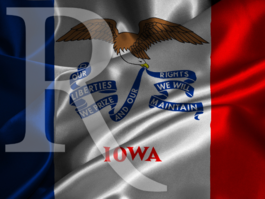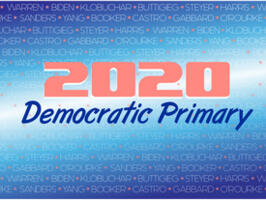In Iowa, It's Up Close and Personal
A Commentary By Kyle Kondik
As the Iowa Straw Poll in Ames was wrapping up Saturday, a reporter rushed onto the floor of Iowa State University's Hilton Coliseum, where the press was filing their stories. She went up to her colleagues with what she said was a new, breaking quote from Michele Bachmann: Bachmann, the reporter said, had just vowed to make Barack Obama a "one-term president."
Laughs all around. It was a pretty funny joke, because Bachmann had probably used that line a dozen times just that day.
She also used it many times the day before, including when she addressed a crowd at the Iowa State Fair in Des Moines late Friday afternoon. After a long delay, Bachmann gave a quick stump speech at the Des Moines Register's "soapbox" stage -- no longer than three or four minutes long -- before being whisked away by a detail of Iowa state troopers and imposing men in suits (and nearly knocking over several in the crowd, including your humble correspondent). "Well, that was a waste of an hour and a half," said one disappointed fairgoer after her long wait to hear Bachmann.
Bachmann has made a name for herself in this race -- she won the Straw Poll, by a hair over Ron Paul -- by being tightly disciplined and staying on message. But message and discipline can come with a price -- and that price is oftentimes accessibility, to the general public and the press alike. A day after winning the Straw Poll, Bachmann had her first encounter with new presidential entrant Rick Perry. As Ben Smith and Jonathan Martin recounted in a scathing Politico piece, Perry easily conversed with the crowd while Bachmann shunned contact and traveled with several staffers. Congressmen and senators do oftentimes have large entourages, which may be par for the course in the Capitol, but they stick out to those outside of Washington who aren't used to seeing politicians walking around with so many handlers.
Obviously, prominent politicians need to have security -- we need only remember the horrific Gabrielle Giffords shooting to know that our leaders are too often put in danger -- but there's a difference between security and staffers.
Of course, the benefit of being tightly scripted is that one can avoid costly gaffes. Perry, and Mitt Romney, learned that lesson in Iowa.
Romney, instead of speaking for just a few minutes at the state fair "soapbox" last Thursday, decided to give a longer talk and engage with some protesters, uttering his now oft-quoted declaration that "corporations are people." He's not really wrong about that -- the context of the statement is that at the end of the day people are the ones who are affected by the corporate tax hikes his hecklers were demanding -- but a bad soundbite is a bad soundbite.
On Monday in Cedar Rapids, Perry responded to a question about Ben Bernanke and the Federal Reserve: "If this guy prints more money between now and the election, I dunno what y'all would do to him in Iowa but we would treat him pretty ugly down in Texas. Printing more money to play politics at this particular time in American history is almost treasonous in my opinion."
Effectively threatening violence against the chairman of the Federal Reserve drew a rebuke from Bush political svengali Karl Rove and others. Even Virginia Gov. Bob McDonnell, newly minted as the chairman of the Republican Governors Association thanks to former Chairman Perry's presidential bid, said that he "might have said it a little bit differently."
Perry's Federal Reserve comments are notable for another reason: They are the clearest signal that the campaign of this race's forgotten man, Ron Paul, might be having its desired effect: bringing the longtime congressman's ideas on monetary policy and maybe -- maybe -- his dovish stance on war and peace closer to the mainstream. Paul, who finished a strong second in Ames, was greeted by the sound of crickets from the national press, as cleverly noted by Jon Stewart earlier this week. But Paul's positions, which will be carried on in the national conversation by his talented son, Kentucky Sen. Rand Paul, are slowly making their way into the Republican debate. Perry, clumsily trying to stake out Paul-ish ground on the Federal Reserve, is evidence enough of that.
Of course, to the opposite side of the right-wing political spectrum from Paul lies the man to whom Perry is most often compared: George W. Bush. The ex-president who launched American interventions in Afghanistan and Iraq, and who in the waning days of his presidency coaxed extraordinary powers out of Congress in order to save the American financial system, is no Paulite -- and he's no Tea Partier either.
Despite Perry's addition to the presidential field, the Bush wing of the Republican Party still doesn't have a horse in this race. It's not Perry -- who, according to Texas Monthly, has been on the skids with the Bushes ever since he ignored Bush's request to run a positive campaign for lieutenant governor back in 1998 -- and it's not Romney, who seems to be the Establishment candidate in this race despite not having the support of the Establishment. And it's certainly not Michele Bachmann or any of the rest of the presidential field.
This is why Indiana Gov. Mitch Daniels -- Bush's former budget director -- almost jumped into the race a few months ago. And it's why this field may not be full yet: Rep. Paul Ryan (WI), the GOP's leader on economic policy, might yet enter the fray.
How would Ryan do as a presidential candidate? No one knows. But here's one indication: Instead of holding free town hall meetings back in his Wisconsin district this summer, Ryan is holding telephone town halls and appearing at a Rotary Club event that is charging a $15 attendance fee. Is Ryan closing down access thanks to flak he received back in April, when his budget plan that changed Medicare was the talk of the political world? He denies it.
Ryan, like other pretend candidates, looks good in theory: Unquestioned conservative bona fides, articulate, handsome spokesman for Republicanism, etc.
But if he gets in the race, he can expect the same bumps in the road that Bachmann, Romney and the latest savior of the week, Perry, encountered in Iowa in the past week.
Kyle Kondik is a Political Analyst at the Center for Politics at the University of Virginia.
See other Political Commentary by Kyle Kondik.
Views expressed in this column are those of the author, not those of Rasmussen Reports.
Rasmussen Reports is a media company specializing in the collection, publication and distribution of public opinion information.
We conduct public opinion polls on a variety of topics to inform our audience on events in the news and other topics of interest. To ensure editorial control and independence, we pay for the polls ourselves and generate revenue through the sale of subscriptions, sponsorships, and advertising. Nightly polling on politics, business and lifestyle topics provides the content to update the Rasmussen Reports web site many times each day. If it's in the news, it's in our polls. Additionally, the data drives a daily update newsletter and various media outlets across the country.
Some information, including the Rasmussen Reports daily Presidential Tracking Poll and commentaries are available for free to the general public. Subscriptions are available for $4.95 a month or 34.95 a year that provide subscribers with exclusive access to more than 20 stories per week on upcoming elections, consumer confidence, and issues that affect us all. For those who are really into the numbers, Platinum Members can review demographic crosstabs and a full history of our data.
To learn more about our methodology, click here.


